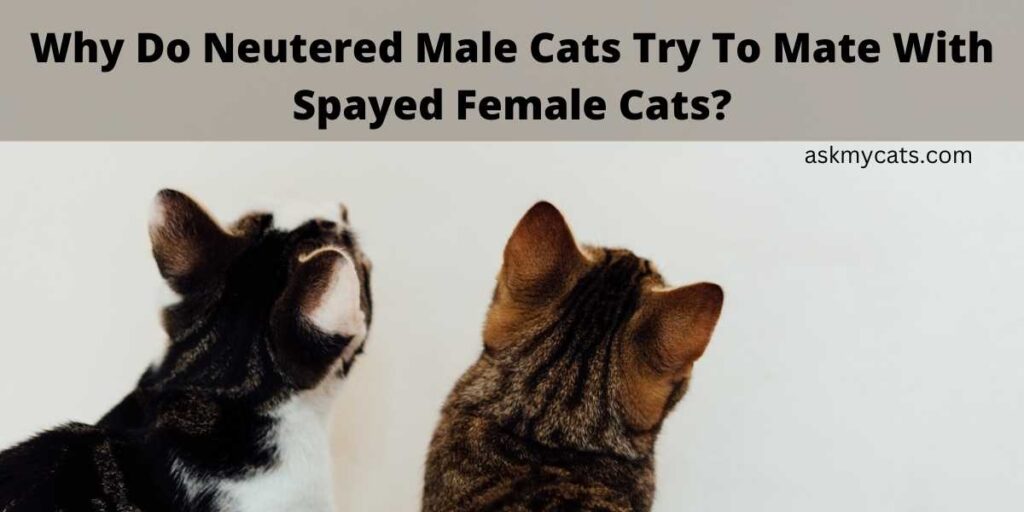This feline behavior is really confusing, isn’t it?
Nonetheless, you’ve done a great job by getting your cat operated on. This prevented the birth of many kittens who’d be deemed as an unnecessary burden to the environment.
In this article, you’ll get to know why operated male cats and spayed female cats still get the urge to copulate and how you can possibly stop this concerning behavior.
Let’s get into it.


Give Your Cat the Perfect Day
Get the Free Ebook!
Do Spayed And Neutered Cats Still Mate?

Yes. Sometimes, Spayed females and neutered male cats tend to exhibit this behavior. The reason for doing so is that there is still some residual hormone left in their bodies after they are operated on. They take a few days to weeks to leave their system, and till then, cats can exhibit mating behavior.
Before you say that it’s not possible and that the whole point of making them go through the surgery is to stop them from mating, check out why they do what they do.
90% of the time, castration minimizes roaming. Although neutering significantly decreases sexual attraction, some seasoned males may still find females to be attractive and continue to mate with them.
DO NOT overlook the importance of getting your cat “neutered”‘ or “spayed” because:
The Significance of Neutering
Orchidectomy refers to the procedure of neutering or castrating male cats.
Toms’ residual testicles will continue to release hormones and behave in ways that are characteristic of intact male cats if they are not removed.
Cats are not given vasectomies since they are sterilized yet the generation of male hormones is not stopped.
The behavioral advantages of castration come from both sterilization and the elimination of masculine hormones.
By reducing the likelihood of prostate issues and eradicating the possibility of testicular cancer, neutering also helps to prevent other ailments.
The Significance of Spaying
A female cat’s ovaries can be removed to stop heat cycles and generally lessen undesirable behavior that might annoy a cat owner.
You can contribute to the effort to stop the birth of unwanted pups and kittens by having your queen sterilized.
Spaying can help prevent undesired litters, offer protection from certain significant health issues, and possibly lessen many of the behavioral issues brought on by the mate-seeking impulse.
Female cats should be spayed as young as possible to help prevent significant health issues, including breast cancer and uterine infections later in life.
Interesting Read: Can A Male Cat Still Impregnate After Being Neutered?
Why Is My Neutered Cat Trying To Mate With My Spayed Cat?

Male cats still exhibit strong female attraction even after being neutered because they have high levels of testosterone in their bodies. He’ll scent a woman many blocks away, and he’ll be itching to leave the house and find her. A plush animal, a table leg, a pillow, or anything else he can reach will probably be humped if he isn’t permitted to go outdoors.
About 90% of male cats that have been neutered no longer exhibit undesirable habits like voracious mounting activity, but it should be noted that 10% of cats still do.
Following the operation, some of these cats will continue spraying pee to identify their territory for a while—possibly permanently.
The process sort of lowers the dimmer switch way down, but there is still enough of the male behavioral instinct left to be bothersome, so owners should be aware that in some cats, neutering does not fully turn off the sexual lights.
Reasons for the surge in testosterone:
- It’s likely that the surgeon made a mistake and only removed one of the cat’s testicles during the procedure. If that’s the case, an injection of the hormone gonadotropin-releasing hormone (GnRH) will cause a spike in testosterone, which will make any remaining testicular tissue visible. It does happen, but it’s quite uncommon.
- Clomipramine and fluoxetine are two pharmaceuticals that may be useful in reducing a cat’s persistent sexual aggression after it has been effectively castrated. They can lessen the intrusive behavior. Despite the fact that these medications are becoming more and more popular for the inhibition of undesired sexual drive, they should only be taken under the close supervision of a veterinarian.
You May Also Want To Know: Do Spayed Female Cats Still Have The Urge To Mate?
How Do I Stop My Neutered Male Cat From Mating With My Spayed Female Cat?

1. Try Reducing Their Stress
Ensure that your cat receives the attention, mental challenge, and exercise he requires. Play with your cat every day, if not more. Take steps to reduce stress if you can identify a source of it.
2. Keep Them Distracted
Clap your hands loudly or throw a book to the ground when you notice your cat getting ready to hump or breed with your spayed queen.
You might also give a humming male a plush animal in hopes that he will leave your other cat alone.
3. Encourage Territory Expansion
Giving your cats greater room to expand their individual territories might also be helpful. Give each cat their own cat tree and window perch, because cats love to climb.
For basic necessities, you may occasionally need to provide every cat its own personal room. Water and food bowls should ideally be placed in separate areas to prevent competition for resources.
You should also adhere to the “two plus one” litter box rule, which states that you need three boxes for every two cats. To ease tensions and ensure that all cats have their privacy, make sure that they are not visible to one another.
4. Give Them Rewards
Find strategies to praise your male cat for acting well. When he is calm and getting along well with your other cats, you can reward him with treats, toys, or additional attention.
Compared to traditional methods of punishment like yelling or squirting him with water, this is significantly more effective. Of course, you ought never to strike your cat.
5. Use Of Medication
There are numerous pharmacologic treatments that may be useful in lowering a neutered male’s propensity to exert sexual dominance.
However, it would be wise to have an offending male cat examined to ensure that the neutering procedure he underwent was done correctly before attempting any of these medications.
It is sometimes necessary to treat overly aggressive male cats with fluoxetine, but it is preferable to treat the females in the household using topical androsterone, a pheromone produced by males.
Every other day or so, apply this pheromone with a little cloth on the rear of a female cat. When a male approaches, he will stop short and turn away due to the strong aroma of maleness.
6. Patience And A Vet
It requires patience on your part. This behavior will stop on its own in a matter of weeks; in the meantime, maintain your composure and refrain from hitting your cat, even when it pushes your patience.
Call your veterinarian right away if you think your pet is ill. Always consult your veterinarian with any health-related queries as they have evaluated your pet, are familiar with its medical history, and can provide the best advice for your pet.
Must Read: Can A Neutered Cat Live With An Unneutered Cat?
Frequently Asked Questions
Do spayed cats still want to mate after the surgery?
Yes, female cats who have been spayed can continue to reproduce for a while, but they do not give birth to kittens.
The hormones may take some time to entirely leave the cat’s body after spaying. Therefore, spayed female cats may still breed for a short period of time after surgery—typically 1 to 2 months.
Their mating won’t result in any unwanted pregnancies, though, because their reproductive organs are removed after surgery.
Can neutered male cats get other female cats pregnant?
It takes several days for all of the leftover sperm to filter out of the pipes after the testicles are removed. A newly neutered male cat still has time to impregnate females during this period.
The decline in the male’s testosterone levels can take more than a week. He will continue to be more likely to fight, spray, and exhibit other unwanted behaviors during this time.
Final Words
It is undeniably true that cats that have been spayed or neutered live longer on average than those who have not. An increased desire to roam is one factor contributing to unaltered pets’ shorter lifetimes.
They may be exposed to conflicts with other animals, where they may sustain wounds and infections, as well as trauma from collisions with moving vehicles and other unintentional accidents.
That is all there is to know about neutered and spayed cats’ post-surgery sexual behavior. I hope that everything is covered here and that all of your questions have been addressed, from what causes it to how to stop it.
Let us know in the comments section if your operated cats ever exhibit these kinds of attributes. What did you do to calm them down?
Interesting Read: Can A Neutered Male Cat Bite A Female Spayed Cat?

Thank you, Abigail, what a helpful resource! I ❤️the various levels of detail on the causes and what cat guardians can do to calm help their cats, myself included. I’ll definitely speak with my veterinarian about my two kitties (Action Jackson and foster kitten Precious) and share your article with my awesome clients at Hello Pretty Petsitting (@hppetsitting)
Glad to know that you found it helpful and informative…
Happy cat parenting